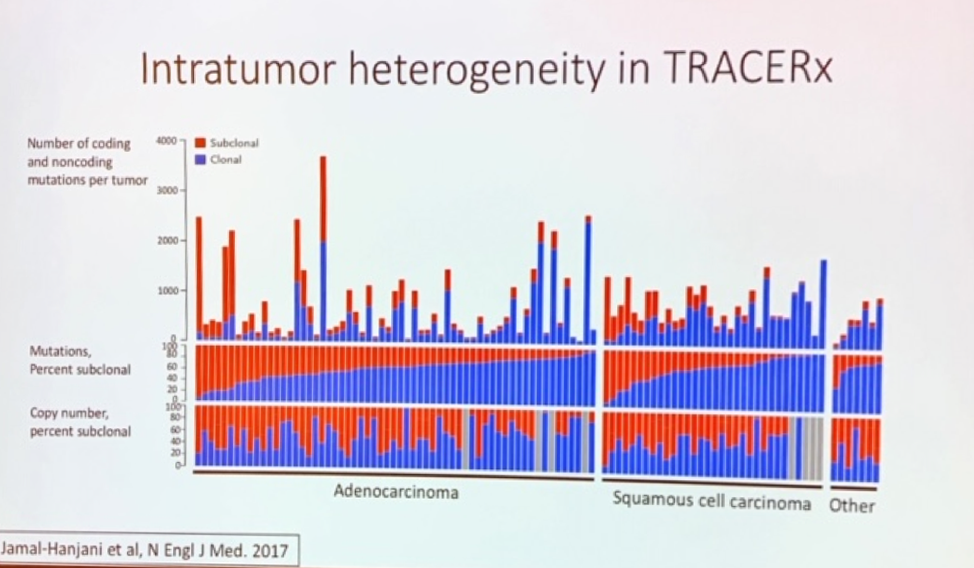Aarhus, Denmark (UroToday.com) Nicolai Birkbak, Aarhus University, presented the International Bladder Cancer Network (IBCN) Keynote address regarding clonal evolution and lessons learned from TRACERx. There are 3 types of tumor heterogeneity: intertumor, intratumor and intracellular heterogeneity. Tracking Cancer Evolution through therapy (TRACERx) is a multi-centre UK-wide prospective study (20+ sites) which performed multi-region sequencing primary lung cancer tumors. Clinical endpoints were multiple and the focus for the talk was to understand the relationship between diversity and outcome. They defined intratumor heterogeneity in lung cancer adenocarcinoma and squamous cell carcinoma which was tested as a prognostic biomarker. They found no difference in mutational but found significant copy number burden in lung cancer. However, is lung cancer driven by mutational burden? They found mutations caused by smoking are mostly pre-cancer thus smoking induced mutations. Indeed, copy number alterations were highly prevalent in lung cancer. However, what about chromosome instability? Using mirrored subclonal allelic imbalance allows us to track parental chromosomes.
How do we measure intratumor heterogeneity in the clinic? Sampling bias is a concern regarding molecular marker development. Pooling samples from the same tumor may improve tumor heterogeneity. Using TRACERx they defined RNA heterogeneity quadrants of clonally expressed genes. They also found chromosomal gains in clonally expressed (Q4) genes encode cell proliferation modules. They used the TCGA lung cancer RNAseq expression dataset to develop a clonal 23-gene prognostic signature. They validated this signature in 5 independent cohorts which were associated with overall survival. They then tested whether this signature had a prognostic role and aid in decision-making in the future. Further prospective validation is needed to determine clinical applicability. This work is an example of how clonal evolution can be further assessed in bladder cancer.
Presented by: Nicolai Birkbak, PhD, Associate Professor, Department of Clinical Medicine, Department of Molecular Medicine, Aarhus University, Aarhus, Denmark.
Written by: Stephen B. Williams, MD, Medical Director for High Value Care; Chief of Urology, Associate Professor, Director of Urologic Oncology, Director Urologic Research, The University of Texas Medical Branch at Galveston, TX and Ashish M. Kamat, MD, Professor, Department of Urology, Division of Surgery, The University of Texas MD Anderson Cancer Center, Houston, TX at the 2019 International Bladder Cancer Network (IBCN) Annual Meeting October 3-5, 2019 - Aarhus, Denmark


